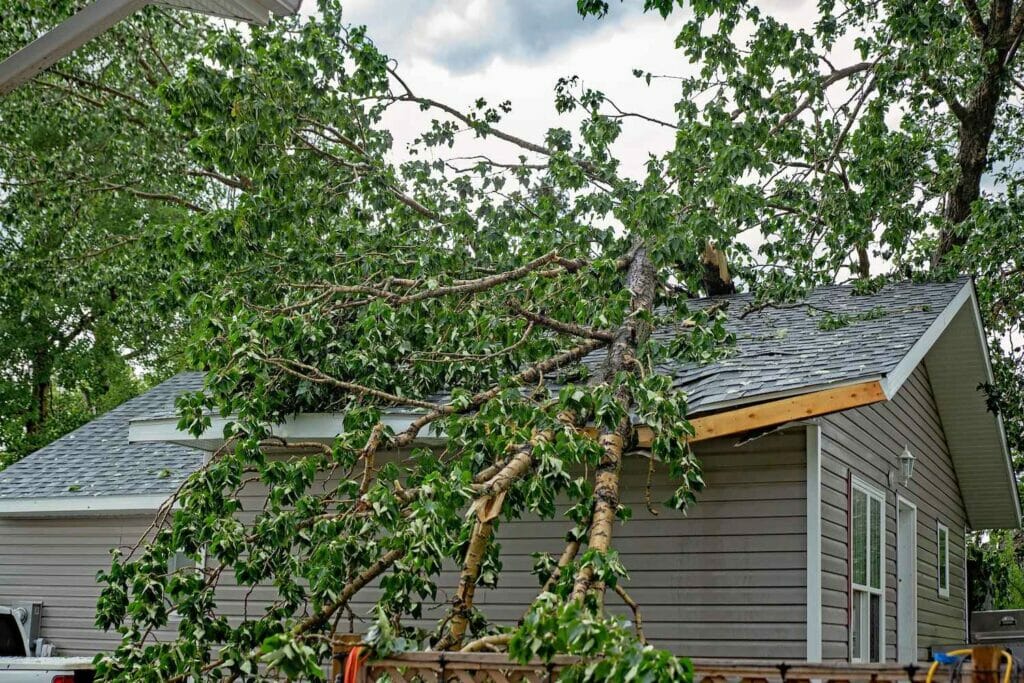Having your entire roof repaired can be costly. Homeowners need to know most insurance companies can help offset some of their roof damage expenses.
Before submitting an insurance claim, it might be beneficial to ask a roofing contractor to evaluate the damages. Your insurance agent may ask for estimates for roof repairs. However, your Insurance Company may provide an adjuster to estimate the damages. But, it never hurts to have a rough estimate of costs beforehand.
For further assistance in homeowners insurance, we have composed a list of four insurance replacement questions every homeowner should know.
1. HOW MUCH MONEY WILL I HAVE TO PAY TO HAVE MY ROOF REPAIRED?
The answer to this question depends on your insurance company. However, if your insurance claim is approved, you will usually only need to pay your deductible for roofing repairs.
2. WHAT DAMAGES DOES MY INSURANCE COMPANY COVER?
Depending on insurance companies and the conditions of your homeowner’s insurance coverage, most damages to roofs by insured homeowners are covered in the following events:
ACCIDENTS
Most insurance policies cover damage to roofs caused by accidents, such as accidental discharging of water or steam, electrical surges, cracked pipes, or other faulty household products.
FIRE DAMAGE
Generally, most insurance policies cover damage to roofs caused by fire and smoke, wildfires, and vandalism.
WEATHER RELATED DAMAGE
In many cases, insurance companies also cover damage to your roof due to storm damage, such as sleet, ice, prominent hail damage, wind damage, or snow landing on your roof.
FALLING OBJECTS
Often roofs become damaged from falling objects, such as tree branches falling due to lightning. Many insurance companies will cover damages to your roof caused by falling objects. If in doubt, consult your insurance adjuster and always read the fine print in your insurance policy to ensure coverage in the event of falling objects.
THIRD-PARTY VANDALISM
Most homeowners are covered if their roof becomes damaged due to vandalism, theft of shingles, or other essential roof parts.
NATURAL DISASTERS

In some cases, there is coverage if a roof becomes damaged from natural disasters, such as hurricanes, tornados, and severe thunderstorms. However, not all policies cover roof damages caused by natural disasters, so it is always best to check with your insurance provider before submitting a claim.
Most insurance companies also have stipulations in the fine print of your insurance policy that you must adhere to to be eligible for insurance coverage, such as:
- Keeping up with regular maintenance
- Replacing old and faulty materials
- Having work done by a reputable contractor
3. HOW DOES AN INSURANCE ROOF REPLACEMENT PROCESS WORK?
When it comes to having repairs done through an insurance company, nothing moves as quickly as you’d like. Every step goes through the proper channels before advancing to the next stage.
To help answer some of your questions about the procedure, we have put together a step-by-step guide on how the insurance roof replacement process works:
STEP 1: ACCESS THE DAMAGE TO YOUR ROOF
The first step is to check the damage sustained to your roof. If only minor repairs are needed to fix your roof, you might decide to pay for the damages out of your pocket to avoid an insurance claim.
However, if there are costly damages to your roof, you need to call your insurance company. Your adviser will start an insurance claim on your behalf.
STEP 2: EXPECT A VISIT FROM INSURANCE ADJUSTER
When speaking to your insurance company, they will schedule an appointment for an insurance adjuster to visit your premises and estimate the damages to your roof.
Some insurance companies may ask you to provide insurance quotes by obtaining a qualified roof contractor to estimate the damages to your roof.
STEP 3: CLAIM APPROVAL
After the damages to your roof are estimated by your insurance company or a reputable roofing company and reported to the insurance adjuster, your insurance claim will either be approved or denied.
There are several factors for an adjustor to consider before an insurance company approves your insurance claim, such as:
- The cause of damages
- The shape of the existing roof before damages
- Whether or not maintenance and repairs were kept up
STEP 4: REPUTABLE ROOF CONTRACTOR IS HIRED
A reputable roof contractor can now be hired to repair your damaged roof. Some insurance companies will provide the contractor for you, while others will allow you to choose your reputable contractor. Some insurance companies may also ask for more than one insurance quote from reputable roofing contractors.
Before the work can begin on your roof, the contractor will submit a proposal to your insurance company. If your insurance company accepts the proposal, papers will be signed between both parties on a set price for the repair work to be completed.
STEP 5: WORK COMPLETED
Once your insurance claim is approved and the terms of the roofing contractor are accepted by your insurance provider, repair work on your roof can begin.
Steps may vary slightly, depending on the insurance company. From beginning to end, this can be a lengthy process when it comes to having the work completed through insurance.
4. WHAT IF MY CLAIM IS DENIED?
Not every insurance claim is approved. There are several factors insurance companies take into account, including:
- The time it took to report your damage claim to the insurance company
- The amount of damage to your roof and the replacement cost
- The type of damage and if it is covered under your insurance policy
5. WILL MY PREMIUMS INCREASE AFTER FILING AN INSURANCE CLAIM?
Again, every insurance policy differs. However, after filing a roof insurance claim, expect your premiums to increase from approximately 9% to 20%, depending on the number of previous insurance claims. The actual cash value per year will vary depending on the amount of your insurance policy.
FINAL THOUGHTS
Roof repairs can be daunting when you are unfamiliar with the ins and outs of insurance claims. However, it doesn’t have to be complicated when you know what to expect from your insurance provider. We hope we have provided valuable answers to your insurance roof replacement questions every homeowner should know.




